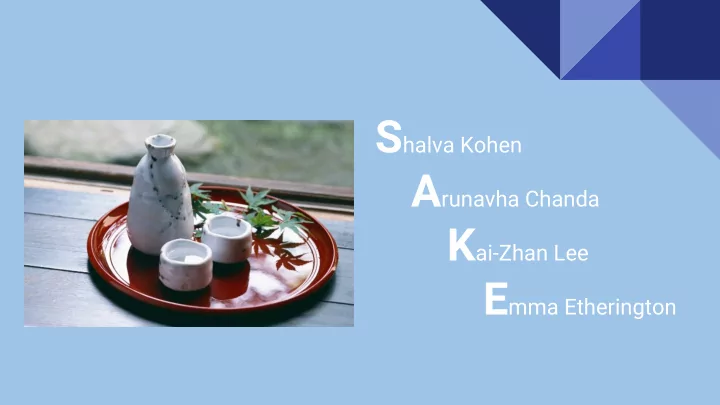

S halva Kohen A runavha Chanda K ai-Zhan Lee E mma Etherington
The problem: FSMs Basis of CS and CE ➢ Current standard for representation: ➢ ○ Unintuitive interface ■ Very long descriptions ■ Redundant behavior commands ○ Learning curve from C-like languages ■ Syntax ■ Style “The less intelligent things you have to do, the more stupid things you have to do.”
The solution: FSMs! Our solution: ➢ ○ Language derived from OOP languages to describe and simulate FSMs ○ Duality: ■ Offers user-friendly interface for constructing FSMs ■ Retains imperative nature of OOP languages X: “Did you just change everything?” Y: (Calmly) “Yeah.”
Cool Things ➢ “Tick function” as clock ➢ Reset function ➢ State boundaries ➢ User-friendly program structure relating to FSM diagrams ➢ Automatic generation of header files! ➢ Concurrent execution of FSMs “But clocks tick. Clocks don’t clock!”
Features of Language Input and output lists and types ➢ Public variables: Read-global, ➢ write-local User-defined types ➢ Most intuitive features of both ➢ automata and C programming “So two things. First thing is it might work if I make this an unsigned int. Can I make this an unsigned int?” “Sure. Go ahead.” “Right. So the second thing is I don’t know how to make this an unsigned int.”
System Architecture scanner.mll parser.mly restruct.ml Sake file Tokens SAST AST semant.ml llvm_generator.ml header_generator.ml C header file Tick function (LLVM IR) C wrapper G C C c o file m p i l a t i o n GCC linking Sake executabl C Object e User’s end
Abstract Syntax Tree (AST) program fsm input fsms output types publics body locals “I’m totally open to new ideas. I just don’t stmt ... think this one in particular works.” stmt
Parser “Wait, so you’re saying [the] entire parser is a piece of crap?”
LLVM Generation: Tick define { i32, i32 }* @test_halt_tick({ i32, i32 }*, { i32, i8* }*, { i32 }*) entry: reset: ; preds = %entry Two initial checks ➢ %null = icmp eq { i32, i8* }* %1, null %reset1 = getelementptr ... br i1 %null, label %reset, label %check store i32 1, i32* %reset1 %reset2 = getelementptr ... ○ Reset: reset all values store i32 0, i32* %reset2 ret { i32, i32 }* null Halted: return 0 ○ check: ; preds = %entry %ptr = getelementptr ... halted: ; preds = %check %running = load i32, i32* %ptr ret { i32, i32 }* null Allocate memory, update states ➢ %run = icmp ne i32 %running, 0 br i1 %run, label %update, label %halted define void @halting({ i32, i32 }*, { i32, i32 }*, { i32, i8* }*, { i32 }*) update: ; preds = %check entry: "*halt": ; preds = %entry %state = alloca { i32, i32 } %halting = getelementptr ... %ptr = getelementptr ... call void @memcpy(...) ; copy to state %halting1 = load i32, i32* %halting store i32 0, i32* %ptr call void @halting(...) ; FSM update call switch i32 %halting1, label %"*halt" [ ret void call void @memcpy(...) ; copy from state i32 0, label %"*init" ret { i32, i32 }* %0 i32 1, label %One "*init": ; preds = %entry i32 2, label %Two br label %One ] Two: ; preds = %entry One: ; preds = %"*init", %entry In FSM, branch to each %p9 = getelementptr ... %p = getelementptr ... %p10 = load i32, i32* %p9 %p2 = load i32, i32* %p %tmp11 = icmp eq i32 %p10, 1 %tmp = icmp eq i32 %p2, 1 state through switch br i1 %tmp11, label %then7, label %else8 br i1 %tmp, label %then, label %else [... other blocks] [... other blocks] ret void ret void “Those weird little badooshkins…”
Test Suite Uses shell scripts similar to those of MicroC ➢ 3 Scripts ➢ ○ testall.sh ○ traffic.sh ○ adventure.sh Automatic generation of C wrappers ➢ 56 test cases ➢ ○ 34 positive tests ○ 22 negative tests Adventure Program ➢ “OCaml is a weird language. But I am also weird, so it is a good match.”
Uses and Future Steps Applications ➢ ○ Testing state reachability ○ Simple Concurrent FSM execution ○ Master-Slave Concurrency Problems ○ Testing algorithmic state machines Future steps ➢ ○ Implementing Mealy machines and DFAs and NFAs ○ State minimization “We do the thing, then the thing, and then a thing thing. Wait, there’s another thing.”
Lessons Learned Communicate ➢ ○ Know what everyone is doing ○ Make sure they are doing it per group specifications Plan ➢ ○ Think more about what the program will need before coding anything ○ Set an end goal for everyone to work towards Set Realistic Goals ➢ ○ Know the time constraints of each group member Working on the same platform ➢ “We just made progress” “We didn’t. The net movement has been very minimal”
DEMO TIME!!!
Recommend
More recommend